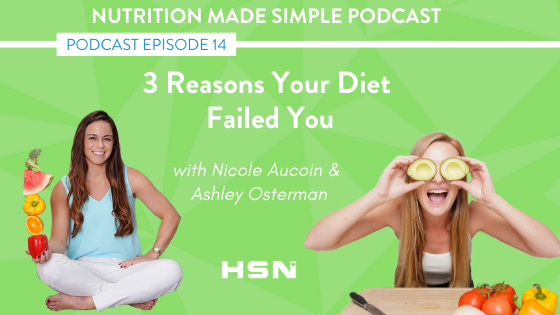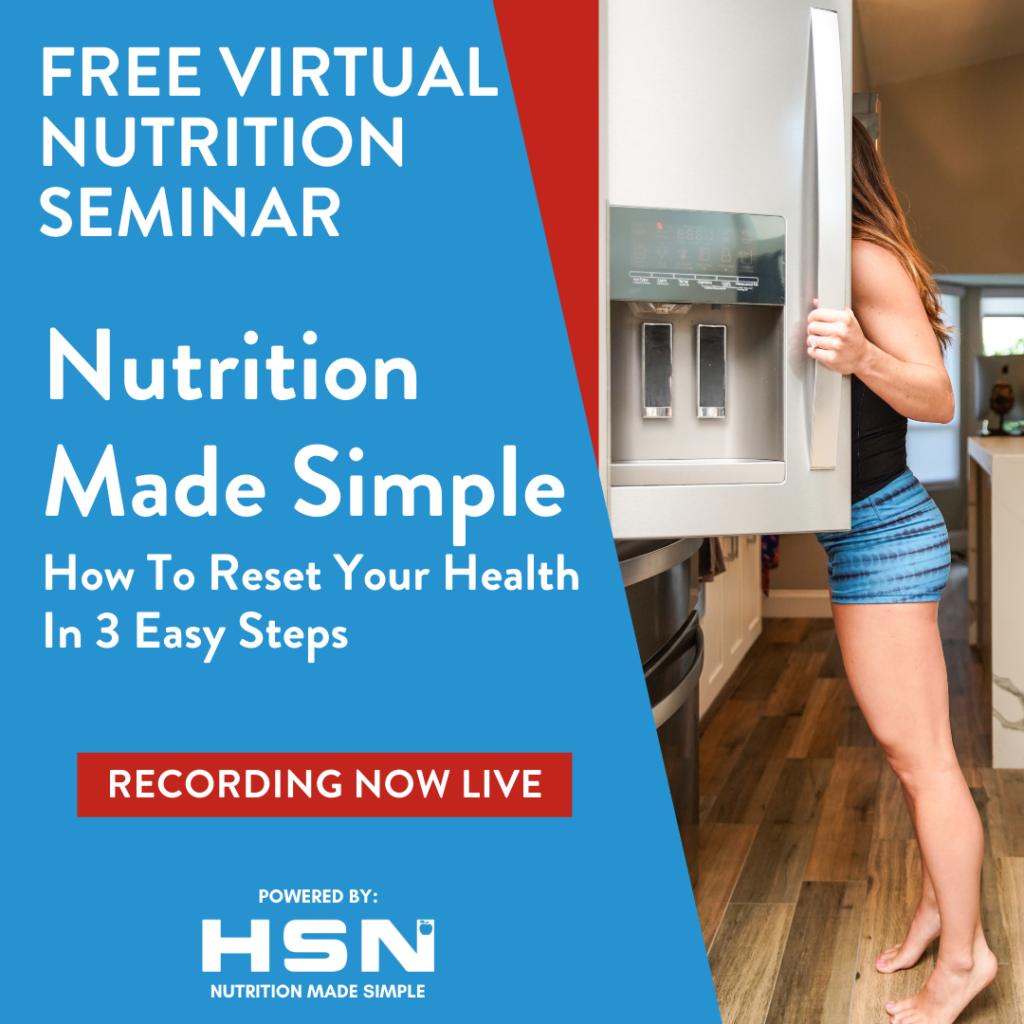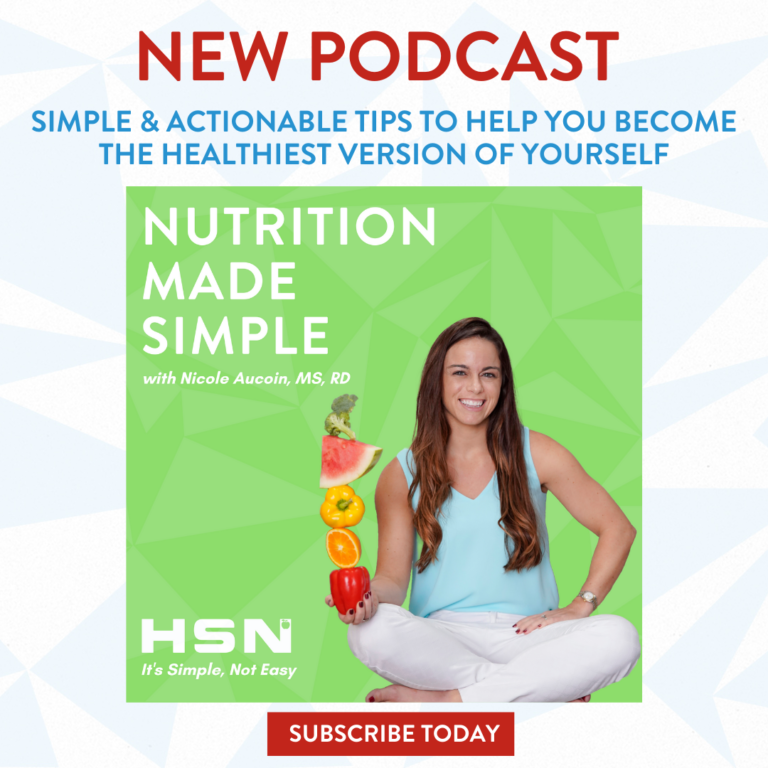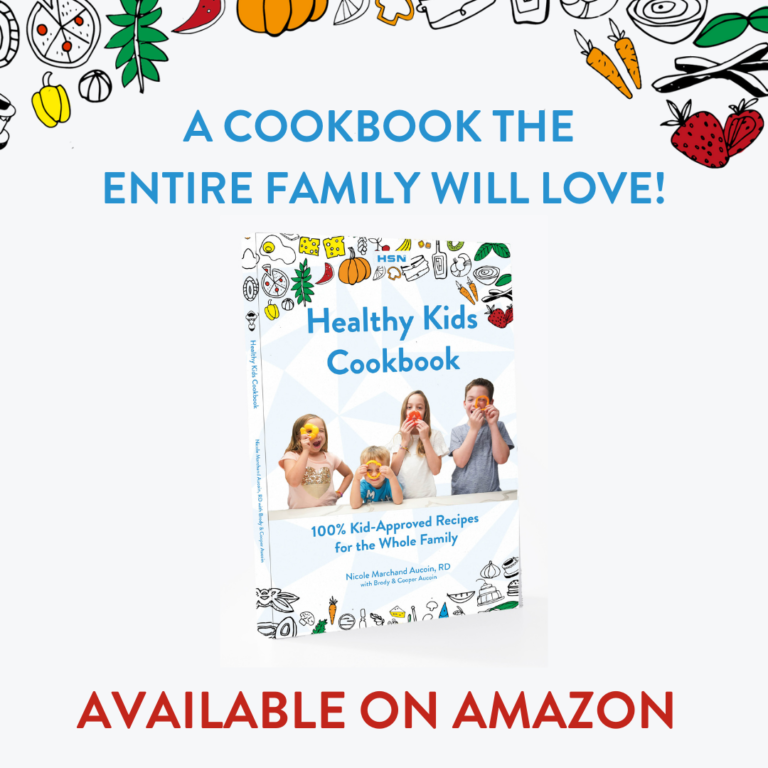Have you failed a diet before? We have all been there!
This week, Ashley Osterman and Nicole Aucoin discuss the three main reasons why diets don’t work.
We are surrounded by diet food, diet information, and the latest diet trends. It’s impossible to go to the grocery store and not see something about a FAD diet. Research shows the average American will try FOUR FAD diets per year. I think we all know the story — you try it, and it stops just as quick as it started. Studies show 65% of people will regain all the weight back and more.
It’s not your fault. We have to flip the switch on diet culture and instead of “dieting,” we must start changing the foundational habits that create our lifestyle.
Are you looking for simple and actionable tips to help you become the healthiest version of yourself? Don’t forget to subscribe to this podcast, so you don’t miss another episode again.
3 Main Reasons Why Diets Don't Work
Diets are too restrictive
There’s so many different diets that are the extreme. Super restrictive diets causes people to change everything and then they go right back to old habits.
One of the telltale signs of a fad diet is it’s going to take out a complete food group or many food groups.
If you were told you can’t have something, you’re going to want it more. You’re going to think about it more. Then you’re probably going to overindulge in it. So instead of restricting something, why not have it in a balanced way? Have a little bit and then move on.
Don’t be too restrictive, balance your meals and incorporate your treats into your healthy, balanced routine.
Inconsistency
Inconsistency is the number one reason why people struggle with weight.
The problem is if you go all or nothing and do this super restrictive diet and you’re not consistent, it’s going to be so tough for you to actually see the results that you’re looking to achieve.
Inconsistency is what you see that’s really inhibiting your progress from moving forward.
If you’re on track Monday through Friday and off the wall Friday night, Saturday, Sunday, and then get back on track on Monday, that’s not consistent.
If you’re struggling with inconsistency, it’s probably because you’re doing too much and it’s too hard. So take a moment, sit down, think about your plan and what can you consistently achieve to push the needle forward.
You are not eating enough
What happens when we don’t eat enough? We’re actually doing ourselves a disservice because we’re slowing down our metabolism. Our body is realizing that we’re starting to starve essentially and wants to slow us down so we can have prolonged life. Eating enough calories and eating balanced meals is what’s going to help you push the needle forward.
You have to really foster that positive relationship with food and you have to eat enough.
A big key factor as to why your diet has failed you, is because you’re not eating enough to keep your body in a healthful state.
ADDITIONAL PODCAST EPISODES TO LISTEN TO
ARE YOU A GYM OWNER OR NUTRITION COACH?
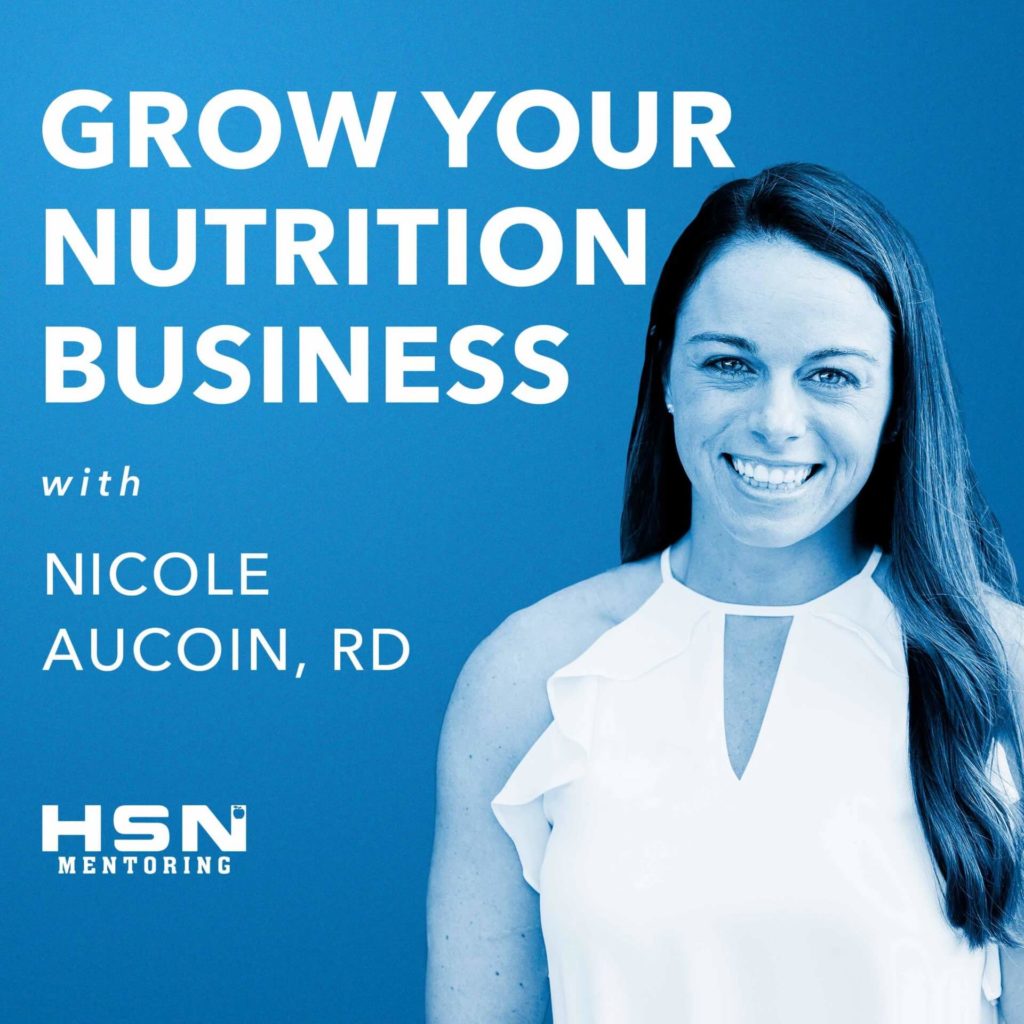
You don’t want to miss the Grow Your Nutrition Business Podcast!
Every week, we provide simple and actionable tips to help gym owners and coaches build a wildly successful nutrition program.
Listen now!
INTRODUCING HIREANUTRITIONCOACH.COM
In this directory, you will find a list of the nutrition coaches and dietitians that use our program, written and overseen by dietitians.
These coaches have gone through coaches evaluations, have ongoing mentoring calls with our experts, and have been nutrition coaching using HSN for a minimum of four months.
Click the link below to find a nutrition coach near you!
Episode Transcript:
Nicole Aucoin (00:03):
Welcome to the Nutrition Made Simple podcast. At Healthy Steps Nutrition, we believe something as fundamental as nutrition shouldn’t be complicated, which is why we focus on a simple habit based approach when working with clients. I’m your host, Nicole Aucoin, registered dietitian and founder of Healthy Steps Nutrition, CrossFit HSN, and HSN Mentoring. I’m also the author of, “The Healthy Kids Cookbook: 100% ‘Kid-Approved’ Recipes For The Whole Family.” You can find it on Amazon. In this podcast, we’ll be teaching you how to take one step at a time to becoming the healthiest version of yourself. Today, Ashley and I are talking about why diets don’t work. Ashley is our director of nutrition, education and lead nutrition coach at Healthy Steps Nutrition HQ. Let’s dive into why diets don’t work.
Nicole Aucoin (00:58):
Well, we are constantly surrounded by diet food, diet information and the latest diet trends. It is impossible to go to the grocery store and not see something about a fad diet. Research shows the average American will try four fad diets per year, four. Think of all the weight loss, but then regained. Then we all know how this story ends. You try it. Then you stop. You feel overwhelmed, and the diet and habits that you created during this diet stop as quick as they started. In fact, studies show that 65% of people will regain the weight that they lost during a diet plus more. It’s not your fault. We must flip the switch on diet culture and instead of dieting, we have to change the foundational habit to create a healthy lifestyle. Before we talk about what diet works or what works in general, we have to understand why diets don’t work. We will get to this episode on three reasons why diets don’t work right after this message.
Nicole Aucoin (02:11):
Do you know someone who’s looking to get healthy this year? We would love for you to share this podcast with them. You never know who could use some words of encouragement. Take a screenshot, post it on social media and tag @healthystepsnutrition so your friends can find some more awesome free health. And don’t forget to subscribe to this podcast so you can listen to every episode. Enjoy. Ashley, welcome to the Nutrition Made Simple podcast. Last week, we talked about five habits of highly successful nutrition clients. And this week, we’re going the opposite; three reasons why diets don’t work.
Ashley Osterman (02:49):
I love this topic. I just love talking about diets and diet culture. So interesting to me, all the things that we are led to believe are going to give us success with reaching our health and wellness goals and how driven they are in making money and marketing. They’re really tricking us.
Nicole Aucoin (03:06):
There are so many different diets out there. I think for most diets, they really probably were started by someone who truly thought that was going to be the way to help someone. But then what happens is money gets involved and then you’ve got all these food products that match that diet name so that more companies can make money. It’s super confusing because there’s so much misinformation out there. You Google, “diet,” there’s billions of different search results. There’s so much information. People are overwhelmed.
Ashley Osterman (03:36):
Yeah. I feel like diet culture too, relies on people having to yo-yo back and forth. You go on this restrictive diet. You may see some great results, but think about it. Are you able to maintain those results long-term? No, probably not. In fact, two thirds of people will regain more weight than they initially lost following a diet. The reason why is that they aren’t building a solid foundation first. They’re just overhauling their lives, focusing on a million things at once and then they just stop.
Nicole Aucoin (04:07):
It’s overwhelming, right? You do all these things, but you never really create a lifestyle of all those things. The research shows that if you try too much and change too much at one time, you’re not going to be able to maintain all of those things.
Ashley Osterman (04:21):
No, the changes don’t stick.
Nicole Aucoin (04:23):
If you just focus on one thing at a time, you’re so much more successful. I want to talk about the first habit.
Ashley Osterman (04:31):
The first reason that your diet has failed. I always tell people, you haven’t failed your diets, your diets have failed you. This is the first reason that diets don’t work and it’s because they’re too restrictive and they’re not setting you up for success. Because think about it, if I tell you can’t have something, are you going to want it more?
Nicole Aucoin (04:54):
Well, you’re thinking about it now. So now, I’m definitely going to want it more.
Ashley Osterman (04:56):
Oh, absolutely. They’ll obsess about it.
Nicole Aucoin (04:59):
There are so many different diets out there that cut out specific food groups. Especially when we’re talking about whole foods, that’s what kind of frustrates me the most. If we’re cutting out fat from nuts, if we’re doing a super low fat diet from nuts and seeds, avocado, there are some health benefits to having healthy fat in your diet. You don’t want to have an over abundance of it, it is the most orally dense macro nutrient, but you definitely need fat in your diet consistently. Or you look at something like ultra keto where you’re having no carbs at all. Well, we need a little bit of carbs, but what type of carbs are we eating? There’s so many different diets that are the extreme. That super restrictive diet causes people to change everything and then they go right back to old habits.
Ashley Osterman (05:47):
Yeah. One of the telltale signs of a fad diet is it’s going to take out a complete food group or many food groups, or it’s going to tell you, you can’t have certain types of things. Again, like I said, if you were told you can’t have something, you’re going to want it more. You’re going to think about it more. Then when I do get it, I’m probably going to overindulge in it. So instead of restricting something, why not have it in a balanced way? Have a little bit and then move on. The second sign that your diet has failed you or the second sign of why your diet doesn’t work is inconsistency. We hear this so often, “I follow the 80/20 rule. So I’m on track 100% 80% of the time, but then come the 20% or the weekend, I go off the wall.” If you’re on track Monday through Friday and off the wall Friday night, Saturday, Sunday, and then get back on track on Monday, that’s not 20%. It’s just not 20%- [crosstalk 00:06:49]
Nicole Aucoin (06:48):
But in people’s minds.
Ashley Osterman (06:50):
We can do the math later, but it’s really not 20%. So the problem is if you go all or nothing and do this super restrictive and you’re not consistent, it’s going to be so tough for you to actually see the results that you’re looking to achieve. But in your mind, you’ve done so well Monday through Friday that you get frustrated because you’re like, “I’m not seeing results. This diet doesn’t work for me.” The inconsistency is the number one reason why people struggle with weight.
Nicole Aucoin (07:17):
Absolutely. The inconsistency is what you see that’s really inhibiting your progress from moving forward. A lot of times when my nutrition clients come to me and they’re like, “Ashley, I think I’ve hit a plateau,” I’m like, “Hold up. Let’s reevaluate because most likely, you haven’t hit a plateau. You’re just not being consistent, or there’s something, some factor that we’re not looking at yet that we need to look at that’s contributing to the stall in progress that you’ve seen.” So we have to be consistent. Inconsistency with your nutrition is one thing, but inconsistency with exercise, if you’re super consistent with drinking a lot of alcohol on the weekends, exercise, there are so many different factors that go into inconsistency. But I would say the number one reason why people fail or their diets fail them is inconsistency.
Ashley Osterman (08:11):
Think about it. If we’re cutting out entire food group, like we’re doing ultra keto and we’re not eating any carbs, how hard is it going to be to stick with that plan?
Nicole Aucoin (08:19):
The thing is life happens, and I don’t want to be the type of person that can’t go out or enjoy a family or go do something and be around a community because I have to eat the certain food that I only have at my house, or I’m weighing and measuring everything and I can’t go out to eat because I’m not going to bring my scale. That’s not realistic long term. So if you instead think about how can we keep it simple and no matter what situation I’m in, I can set myself up for success, that’s going to be such a better strategy long-term. I don’t think it’s people’s fault that they’re inconsistent, right? We’re in this diet culture and cheat days and donuts are abundant. There was a trend in CrossFit for a while that people would bring boxes of donuts after Saturday workouts. It was like barbells and donuts.
Nicole Aucoin (09:15):
It was a big thing. I had so many gym owners for about a year or two asking me, “How do I navigate that? How do I navigate all of my members wanting to go to these gourmet places all the time, every single week, and then they overindulge?” I think it comes back to we have to go to our why and just educate. What you’re doing, is it positively or negatively impacting your goals? There are some different tricks if you have a sweet tooth to help satisfy that sweet tooth, but those different tricks will work with different people. For instance, Ashley, I know you love those little dove chocolates.
Ashley Osterman (09:49):
I do.
Nicole Aucoin (09:50):
I can not have them in my house because I would eat all of them. I’m not the type of person that can have one and then be done. They’re so small and they’re delicious.
Ashley Osterman (09:58):
See, that’s the thing though. You know and understand that. You have figured that out, so you don’t keep him in the house. I know. I’ve searched. But at my house, if you come to my house, you’ll usually find a bag in the refrigerator or the freezer because I can have two and satisfy my sweet tooth and be good to go.
Nicole Aucoin (10:13):
There’s other things like Yasso bars. We love Yasso bars. I eat one a couple times a week. It’s frozen Greek yogurt. They even have chocolate dipped ones. Now, they’re a little bit higher in sugar, but it’s not the same thing as a huge ice cream bar. Even some of our recipes on the Healthy Steps Nutrition page like the strawberry shortcake bar, strawberry shortcake smoothie that you can turn into popsicles is a really great option and a great thing that can satisfy that sweet tooth without going completely overboard.
Ashley Osterman (10:44):
Yeah. What we really strive for when working with our nutrition clients is giving them these types of tips to make it easy. We know everyone’s different, everyone has different struggles and we want to make reaching and obtaining your goals easy for you. So again, if you’re following a diet and it’s just so hard to be consistent, take a moment and think about why that is; probably because it’s not for you. You might need to think about what you can actually obtain and do consistently because that’s how you’re going to move the needle forward. One of the things we do with our nutrition clients is we focus on the plate method. How can you make a healthy balanced meal no matter where you are? If you’re at home with leftovers, you’re out to eat, you’re at a wedding or a party, how can we help you make the best choices with what you’re working with?
Nicole Aucoin (11:32):
If you haven’t heard of the plate method before, we’re starting with half of our plate vegetables. We’re eating those first and that’s non starchy vegetables. Then we’re going to protein. And then we’re going to our starch and saving that at the end because what happens most of the time, especially like, let’s think about pasta. You have a pasta dish and you have a bunch of carbohydrates. You have some sauce. Maybe you add some meatballs or turkey and your red sauce. Now, we’ve overloaded on carbohydrates, but it’s not really that balanced. If we’re not having food that’s balanced, what happens on the inside? Our blood sugar gets spiked up real high, then it crashes and it doesn’t really keep us full for that long, or we get overly bloated, which happens a lot when we go out to eat because we over consume.
Ashley Osterman (12:15):
Yes. Yes. So if you’re having struggled with inconsistency, it’s probably because you’re doing too much and it’s too hard. So take a moment, sit down, think about your plan and what can you consistently achieve to push the needle forward? The last thing that we tend to see with diets, reason why they fail or why your diet has failed you is that you are not eating enough. I see it so much with all of these diets out there. They’re pushing 1000 or 1200 calories a day, asking you to replace meals and snacks with supplements or shakes.
Ashley Osterman (12:53):
Hold up, guys. In case you didn’t know, 1200 calories is the recommended daily intake for a toddler. Unless you’re a toddler, you should not be eating these diet restrictive calorie counts. You’re not eating enough. What happens when we don’t eat enough? We’re actually doing ourselves a disservice because we’re slowing down our metabolism. Our body is realizing that we’re starting to starve essentially and wants to slow us down so we can have prolonged life. Eating enough calories and eating balanced meals is what’s going to help you push the needle forward. Nicole, I know we always talk about when we’re eating adequate calories and balanced meals, getting those whole foods in.
Nicole Aucoin (13:37):
It’s interesting because so many people think, and even I thought this going to school to be a dietician, I remember cheering in college and actually how I found out about the dietician career, I had some eating issues and all of the cheerleaders did, not all, but I would venture to say a lot of us did. They sent us all to a dietician and I left that office and was like, “Hey, I know exactly what I want to do,” but I thought that by eating a super small amount, like a granola bar a whole day, I’ll go a whole day and eat one granola bar… Your eyes right now. I know. I think that way too when I think back of what I was eating. I thought I would lose weight and look a certain way. We’re not all painted to be a picture of an eight pack, right?
Ashley Osterman (14:23):
Absolutely not.
Nicole Aucoin (14:23):
That’s not everyone. I think part of the problem with social media just getting super real right now is that we compare ourselves to everyone and you want to look a certain way and you think that you have to do these crazy things to look that way. When in reality, all of our bodies were made a little bit differently. You have to really foster that positive relationship with food and you have to eat enough. I know for a lot of our clients, it’s a really big struggle to help them understand, “Hey, I want you to just do this experiment where you try eating more and see how you feel. Let’s see how our results are by adding in a little bit more throughout the day.”
Nicole Aucoin (15:02):
I’ve worked with many eating disorder clients over the years, and it is a really big struggle. If you are listening to this and you struggle with eating issues, please reach out to someone because that is something that can affect you many years down the line. There’s so many experts out there that specialize in eating disorders that can help you get in good, healthy patterns. You don’t have to follow a super restrictive diet and not eat barely any calories to see the results you’re looking for.
Ashley Osterman (15:35):
When I think about it, adequately fueling your body is the simplest form of self love. Your body does so much for you and we need to respect it. One of the parts of respecting and loving ourselves is fueling it appropriately. I find that in a lot of these diets and diet culture, the recommended fueling amount is just nowhere where it needs to be. Really, that’s a big key as to why your diet has failed you because you’re not eating enough to keep your body in a healthful state.
Nicole Aucoin (16:08):
Then we go, all right, so you’re not eating enough. Then it causes you some inconsistency and then you end up fasting all day, then binging at night because you’re so hungry and in this state, and then you can’t sleep and then you’re more hungry and more stressed. It’s just this constant vicious circle that causes people to derail from the progress and the goals that they’re looking to achieve. So it doesn’t have to be overnight. If you’re going from being super restrictive and getting those 1000 calories, just try adding a snack and then add a little bit more in. You don’t have to go zero to 100 overnight, but we slowly want to ramp up so that you can get to a place where you are optimizing your metabolism.
Ashley Osterman (16:49):
Yes, absolutely. If you’re listening to this and you are struggling with eating, please reach out. There are so many amazing professionals, teams of professionals that will help support you. I know our dieticians at HSN work with a network of health providers to help support people with eating struggles and problems. So I really encourage you to reach out, get the support you need and get your health back on track.
Nicole Aucoin (17:14):
For sure. So let’s just kind of recap with these three main reasons that diets fail. So first one…
Ashley Osterman (17:20):
It’s too restrictive. Too restrictive, can’t have, restrict that. Of course, you’re going to want it.
Nicole Aucoin (17:25):
Of course, you’re going to want it. So instead of thinking of, “I can’t have X, Y, and Z,” let’s load up on all of the things that are going to fuel our bodies, give us energy, give us the vitamins and minerals that we need. We always talk to kids and with kids’ nutrition, eat the rainbow. It goes the same thing for us. Those different colors provide different vitamins and minerals. So we want to have a variety of fruits and vegetables and meats and healthy fats to have that balance in our diet. There are ways to have healthy treats and stay on track.
Ashley Osterman (18:01):
Yes.
Nicole Aucoin (18:01):
If you want a treat, have it, and then move on. I love Cold Stone. I absolutely love Cold Zone and [inaudible 00:18:07], two of my favorite things and my husband does too. When we go, we share one and then all four of us, the kids too, and then we move on, but we’re all satisfied by having a few bites. It’s not like we’re restricting ourselves, but we don’t need to overindulge with the biggest size and then feel like crap after. If you are the type of person that overindulges, what I would challenge you to do is think back to the last time that happened and what were the things that surrounded that situation, and how did you feel after? A Lot of times when we walk through this with our clients, they realize, “Actually, I felt like crap after, and I didn’t feel good.” Sometimes it just takes thinking about those things to realize, “Hey, I don’t really need to overindulge. If I want a little bit, I can have it and then I can move on.”
Ashley Osterman (18:53):
Yeah. Then think about also two ways that you can portion size. For me, it’s the tiny chocolates, but if you’re like Nicole and you can’t keep him in the house, maybe not a good idea. I know one of our other clients said the mini ice creams in the freezer is another great way. So she has just the one portion and moves on. So remember, don’t be too restrictive, balance your meals and incorporate your treats into your healthy, balanced routine.
Nicole Aucoin (19:16):
Love it. Next thing we need to talk about is inconsistency. So we have to be consistent and really that goes into setting a healthy lifestyle. Finally, we have to make sure we’re eating enough. No one wants to be hangry.
Ashley Osterman (19:27):
No.
Nicole Aucoin (19:27):
No one wants to be mad and angry. I don’t want to be like that. No one wants to be like that when they’re trying to lose weight. So load up on whole foods first. You want to add in all of those vegetables, have some meat, have some starch. Make sure you’re getting in your healthy fat because fat slows down digestion. So it’s actually going to keep you full longer when you add in healthy fat to your diet. So fat doesn’t make you fat, contrary to popular belief. We want to have fat. We want to have some carbohydrates. We want to have protein. All of those things together will help us achieve our healthiest self.
Ashley Osterman (20:01):
Yeah. I challenge you to ditch the calorie goals and just work on balancing your meals with whole foods.
Nicole Aucoin (20:11):
Have you struggled with one of those three things that Ashley and I discussed; diets being too restrictive, inconsistency or just not eating enough? We have all been there. Honestly, I still struggle with not eating enough. It’s so easy to sit in front of my computer and work all day and completely forget to grab something to eat or drink water. He understand where you’re coming from, but there’s things that you can do like setting an alarm if you are struggling getting enough to eat, or prepping and having things easily and ready to go so you don’t to waste time prepping meals in the moment. I have heard it hundreds of times before, “Nicole, I eat well. I just don’t understand why I’m stuck.” Well, there’s a missing piece of the puzzle somewhere. Sometimes it’s obvious and sometimes it isn’t. That is why working with a coach can help you figure out why you aren’t seeing the results that you’re looking to see and create a simple and actionable plan to help you become the healthiest version of yourself.
Nicole Aucoin (21:18):
If you’re thinking, “I need some help,” we would love to help you. You can click the link in the show notes to work with a dietician at our HQ location, or find a Healthy Steps Nutrition coach near you. Again, all you need to do is click the link in the show notes or go to hireanutritioncoach.com to find a Healthy Steps Nutrition coach near you. Remember, you just have to start by taking one step at a time. Don’t change all of the things today. Change one thing at a time. Hope you enjoyed this episode. Please don’t forget to subscribe, so you don’t miss another episode of the Nutrition Made Simple podcast. We’ll see you back next week.

